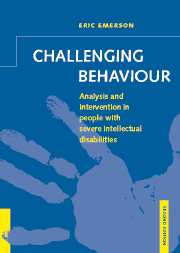3 - Epidemiology
Published online by Cambridge University Press: 14 August 2009
Summary
In this chapter, a number of issues will be addressed which relate to the epidemiology of challenging behaviour. These include:
the number of people with intellectual disabilities who show challenging behaviour;
the prevalence of particular forms or topographies of challenging behaviour;
the co-occurrence of different forms of challenging behaviour;
personal and environmental ‘risk factors’ associated with showing challenging behaviour; and
the emergence and persistence of challenging behaviour.
Epidemiological studies of challenging behaviours have focussed, almost exclusively, on attempting both to identify the prevalence of particular behaviours and investigate the relationship between prevalence and personal or environmental risk factors. In other words, they have attempted to identify the number of individuals in the population under study (e.g. total population of Lancaster) who, at a given point in time, show challenging behaviour and, through the use of correlational methods, to identify those personal and environmental characteristics associated with people being at increased risk of exhibiting these behaviours.
Prevalence rates vary as a function of the incidence and duration (or persistence) of a particular disorder (Kiely & Lubin, 1991). Incidence is a measure of the number of new ‘cases’ appearing within a given population within a specified period of time (e.g. number of live births per year of children with Down's syndrome in Lancaster, number of people developing self-injurious behaviour per year in Cardiff).
Information
- Type
- Chapter
- Information
- Challenging BehaviourAnalysis and Intervention in People with Severe Intellectual Disabilities, pp. 17 - 30Publisher: Cambridge University PressPrint publication year: 2001
